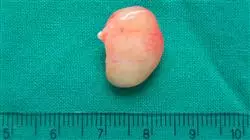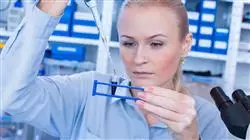University certificate
The world's largest faculty of medicine”
Introduction to the Program
Increasing the life expectancy of cancer patients is a fundamental goal of oncologists. Don't hesitate any longer and increase your knowledge in this field"

The Postgraduate Diploma in Diagnostic and Therapeutic Techniques in Oncology is the result of an extensive study of these types of tumors by leading specialists in the field, who have sought to combine in this program the main concepts and advances in this field, in order to have highly specialized professionals to improve the numbers of deaths from these causes, as well as to make earlier diagnoses and more effective treatments.
Therefore, the student will acquire skills to use molecular biology tools for an agnostic approach to rare cancers, having the opportunity to start from scratch, reviewing molecular oncology concepts in relation to genetics, epigenetics, ctDNA and RNA. Once these aspects are known, students will have in-depth knowledge of the study of tumor DNA, both in solid biopsy and liquid biopsy.
This program focuses on the study of different types of cancer, including head and neck, skin and musculoskeletal cancers, in such a way that a complete and quality program is offered to increase the capabilities of the oncology professional.
In this program, the experts, all of them referents in each field of knowledge, will develop aspects related to the context of this spectrum of pathologies, present the clinical and molecular vision, show their diagnostic and therapeutic approaches and explain complementary aspects such as their research and institutional environment or the global reality of the patients who suffer from them.
Students will be able to complete the program at their own pace, without being subject to fixed schedules or the travel involved in classes where physical attendance is required, so they can combine it with the rest of their daily obligations.
Learn about the latest developments in these types of pathologies and you will notice how you advance in your daily work"
This Postgraduate diploma in Diagnostic and Therapeutic Techniques in Oncology contains the most complete and up-to-date scientific program on the market. Its most outstanding features are:
- Case studies presented by experts in oncology
- The graphic, schematic and eminently practical contents with which they are conceived gather scientific and practical information on those disciplines that are essential for professional practice
- News on tools for head and neck, skin, and musculoskeletal cancers
- Practical exercises where the self-assessment process can be carried out to improve learning
- Its special emphasis on innovative methodologies in the diagnosis and treatment of head and neck, skin and musculoskeletal cancers
- Theoretical lessons, questions to the expert, debate forums on controversial topics, and individual reflection assignments
- Content that is accessible from any fixed or portable device with an Internet connection
This Postgraduate Diploma is the best investment you can make when selecting an up-to-date program for two reasons: in addition to updating your knowledge in Diagnostic and Therapeutic Techniques in Oncology, you will obtain a qualification from TECH Global University"
The teaching staff includes professionals from the Oncology field, who bring their experience to this educational program, as well as renowned specialists from leading societies and prestigious universities.
Its multimedia content, developed with the latest educational technology, will allow the professional a situated and contextual learning, that is, a simulated environment that will provide an immersive training programmed to train in real situations.
This program is designed around Problem-Based Learning, whereby the specialist must try to solve the different professional practice situations that arise throughout the program. For this purpose, the professional will be assisted by an innovative interactive video system created by renowned and experienced experts in Diagnostic and Therapeutic Techniques in Oncology with extensive experience.
This program comes with the best educational material, providing you with a contextual approach that will facilitate your learning"

This 100% online program will allow you to balance your studies with your professional work while increasing your knowledge in this field"
Why study at TECH?
TECH is the world’s largest online university. With an impressive catalog of more than 14,000 university programs available in 11 languages, it is positioned as a leader in employability, with a 99% job placement rate. In addition, it relies on an enormous faculty of more than 6,000 professors of the highest international renown.

Study at the world's largest online university and guarantee your professional success. The future starts at TECH”
The world’s best online university according to FORBES
The prestigious Forbes magazine, specialized in business and finance, has highlighted TECH as “the world's best online university” This is what they have recently stated in an article in their digital edition in which they echo the success story of this institution, “thanks to the academic offer it provides, the selection of its teaching staff, and an innovative learning method aimed at educating the professionals of the future”
A revolutionary study method, a cutting-edge faculty and a practical focus: the key to TECH's success.
The most complete study plans on the university scene
TECH offers the most complete study plans on the university scene, with syllabuses that cover fundamental concepts and, at the same time, the main scientific advances in their specific scientific areas. In addition, these programs are continuously being updated to guarantee students the academic vanguard and the most in-demand professional skills. In this way, the university's qualifications provide its graduates with a significant advantage to propel their careers to success.
TECH offers the most comprehensive and intensive study plans on the current university scene.
A world-class teaching staff
TECH's teaching staff is made up of more than 6,000 professors with the highest international recognition. Professors, researchers and top executives of multinational companies, including Isaiah Covington, performance coach of the Boston Celtics; Magda Romanska, principal investigator at Harvard MetaLAB; Ignacio Wistumba, chairman of the department of translational molecular pathology at MD Anderson Cancer Center; and D.W. Pine, creative director of TIME magazine, among others.
Internationally renowned experts, specialized in different branches of Health, Technology, Communication and Business, form part of the TECH faculty.
A unique learning method
TECH is the first university to use Relearning in all its programs. It is the best online learning methodology, accredited with international teaching quality certifications, provided by prestigious educational agencies. In addition, this disruptive educational model is complemented with the “Case Method”, thereby setting up a unique online teaching strategy. Innovative teaching resources are also implemented, including detailed videos, infographics and interactive summaries.
TECH combines Relearning and the Case Method in all its university programs to guarantee excellent theoretical and practical learning, studying whenever and wherever you want.
The world's largest online university
TECH is the world’s largest online university. We are the largest educational institution, with the best and widest online educational catalog, one hundred percent online and covering the vast majority of areas of knowledge. We offer a large selection of our own degrees and accredited online undergraduate and postgraduate degrees. In total, more than 14,000 university degrees, in eleven different languages, make us the largest educational largest in the world.
TECH has the world's most extensive catalog of academic and official programs, available in more than 11 languages.
Google Premier Partner
The American technology giant has awarded TECH the Google Google Premier Partner badge. This award, which is only available to 3% of the world's companies, highlights the efficient, flexible and tailored experience that this university provides to students. The recognition as a Google Premier Partner not only accredits the maximum rigor, performance and investment in TECH's digital infrastructures, but also places this university as one of the world's leading technology companies.
Google has positioned TECH in the top 3% of the world's most important technology companies by awarding it its Google Premier Partner badge.
The official online university of the NBA
TECH is the official online university of the NBA. Thanks to our agreement with the biggest league in basketball, we offer our students exclusive university programs, as well as a wide variety of educational resources focused on the business of the league and other areas of the sports industry. Each program is made up of a uniquely designed syllabus and features exceptional guest hosts: professionals with a distinguished sports background who will offer their expertise on the most relevant topics.
TECH has been selected by the NBA, the world's top basketball league, as its official online university.
The top-rated university by its students
Students have positioned TECH as the world's top-rated university on the main review websites, with a highest rating of 4.9 out of 5, obtained from more than 1,000 reviews. These results consolidate TECH as the benchmark university institution at an international level, reflecting the excellence and positive impact of its educational model.” reflecting the excellence and positive impact of its educational model.”
TECH is the world’s top-rated university by its students.
Leaders in employability
TECH has managed to become the leading university in employability. 99% of its students obtain jobs in the academic field they have studied, within one year of completing any of the university's programs. A similar number achieve immediate career enhancement. All this thanks to a study methodology that bases its effectiveness on the acquisition of practical skills, which are absolutely necessary for professional development.
99% of TECH graduates find a job within a year of completing their studies.
Postgraduate Diploma in Diagnostic and Therapeutic Techniques in Oncology
Diagnostic and therapeutic techniques in oncology have developed rapidly in recent decades, leading to better disease management and improved patient survival. Among the most widely used diagnostic techniques are positron emission tomography (PET), magnetic resonance imaging (MRI) and biopsy. In terms of therapies, advances in immunotherapy, targeted therapy and radiotherapy have significantly improved the quality of life of cancer patients. It is important to mention that each treatment is unique and personalized for each patient, which implies an individualized evaluation and constant follow-up. At TECH Global University we understand the importance of having highly trained professionals in the field of oncology. Therefore, we have designed our Postgraduate Diploma in Diagnostic and Therapeutic Techniques in Oncology. A comprehensive qualification program, optimized thanks to the benefits of digital learning and cutting-edge pedagogical models.
Specialize in diagnostic and therapeutic techniques in oncology
This comprehensive Postgraduate Diploma is aimed at medical specialists and residents in oncology, as well as other professionals in the health sector who wish to expand their knowledge and skills in the oncology field. At TECH we have focused on providing comprehensive and updated training in the field, through a rigorous and practice-oriented curriculum. In addition, you will have the support of highly trained professionals, who will provide advice and support throughout the training process. Through the curriculum, you will learn the most advanced techniques in diagnosis and treatment of cancer, from the multidisciplinary perspective required in this field. All the pedagogical content will be available on a online teaching platform, 24 hours a day, which will allow you to take the postgraduate course at the times that best suit you.







